人教版新课标高二英语下册选修七unit1 Living well Grammar不定式课件(共31张)
文档属性
| 名称 | 人教版新课标高二英语下册选修七unit1 Living well Grammar不定式课件(共31张) | 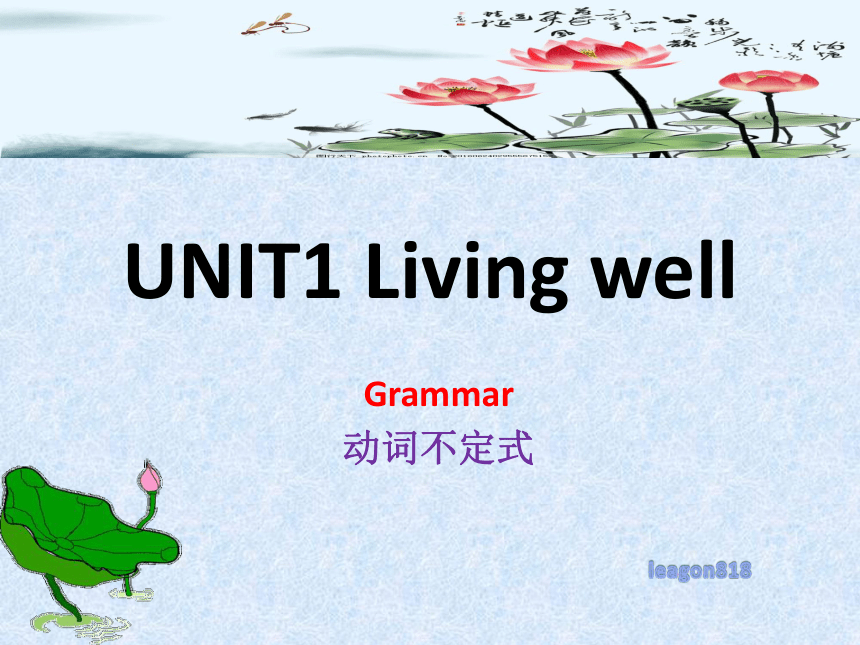 | |
| 格式 | zip | ||
| 文件大小 | 753.2KB | ||
| 资源类型 | 教案 | ||
| 版本资源 | 人教版(新课程标准) | ||
| 科目 | 英语 | ||
| 更新时间 | 2020-04-30 11:42:28 | ||
图片预览

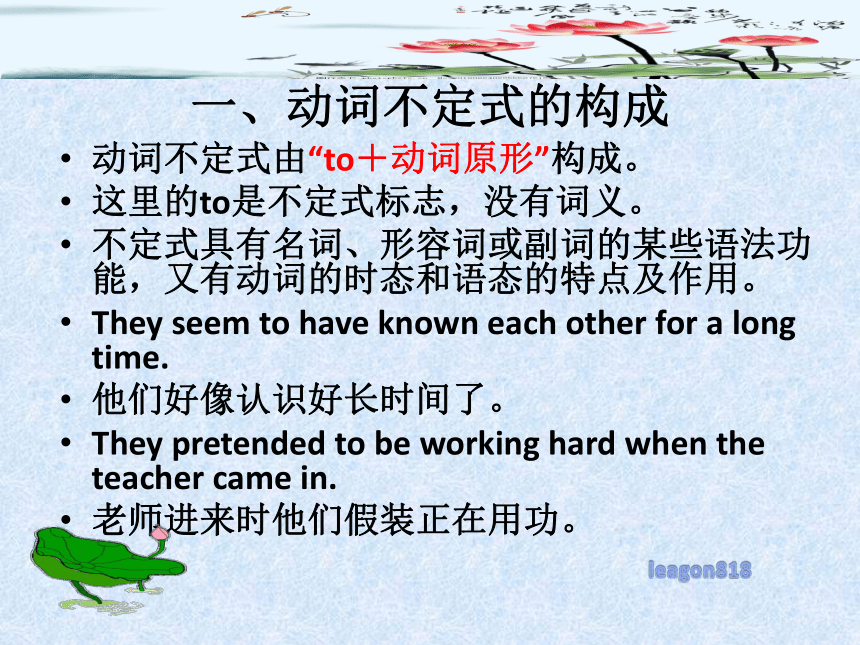
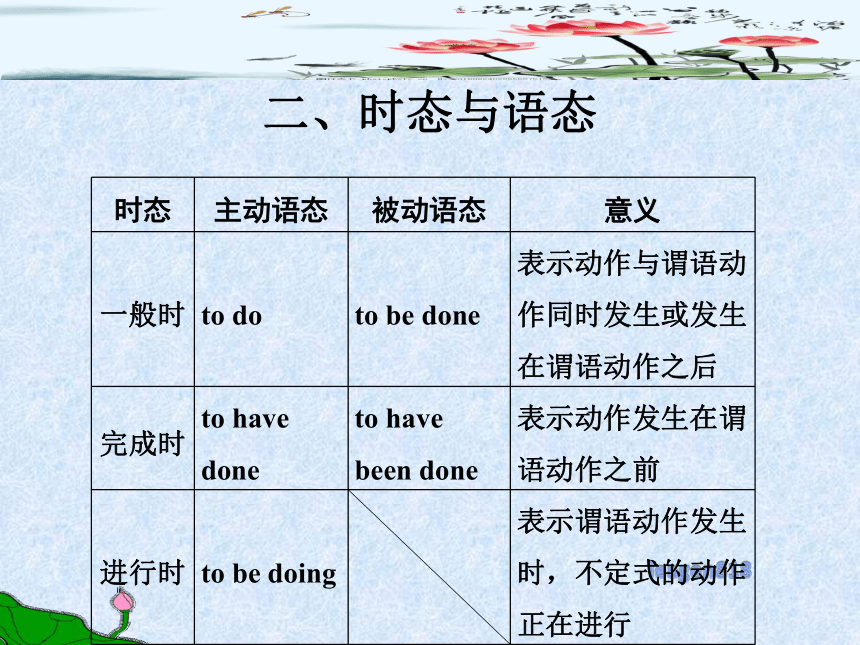

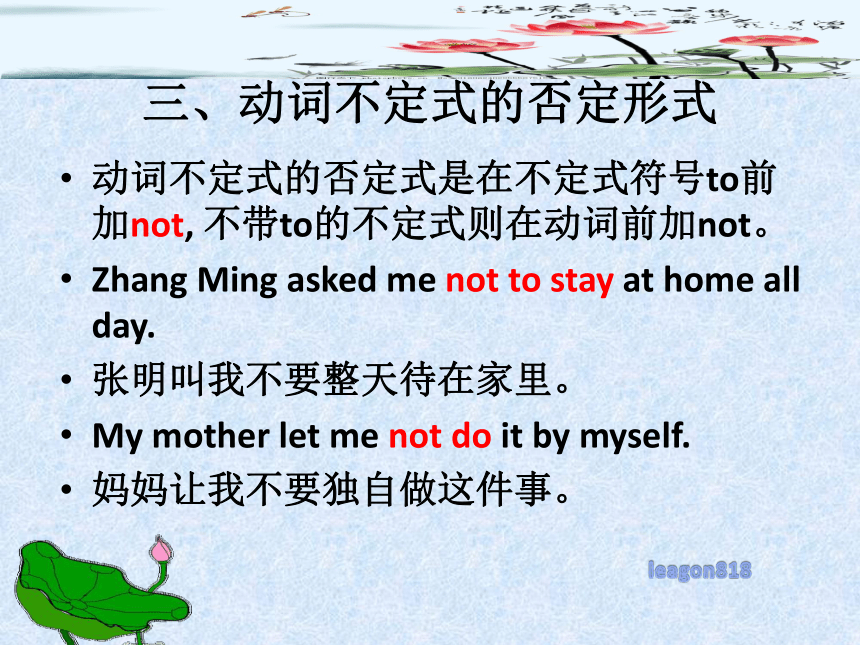

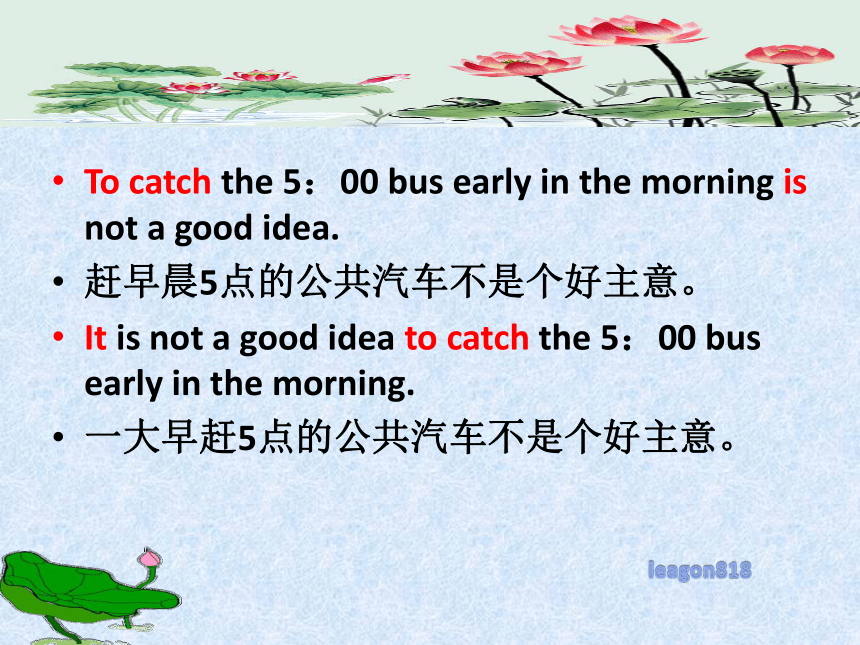

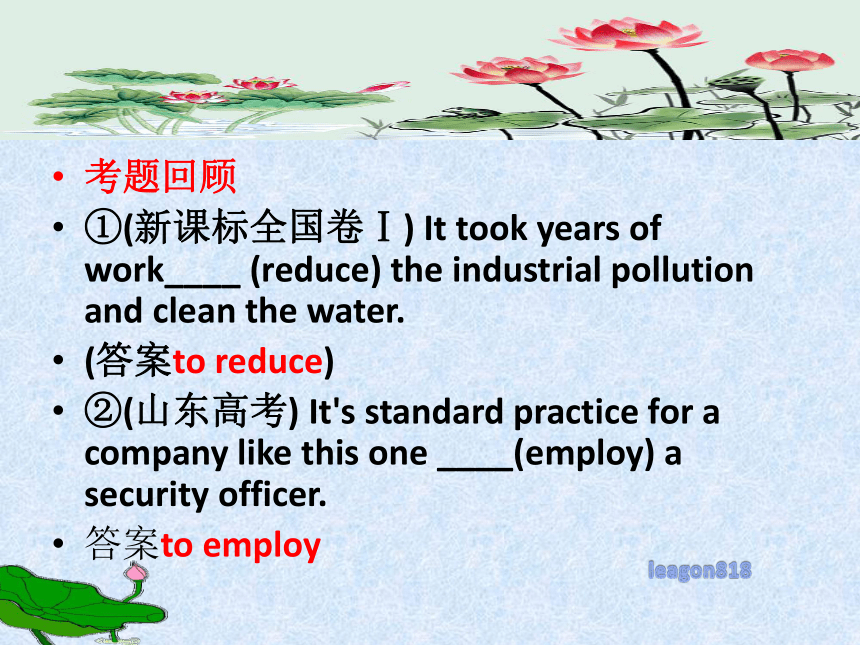


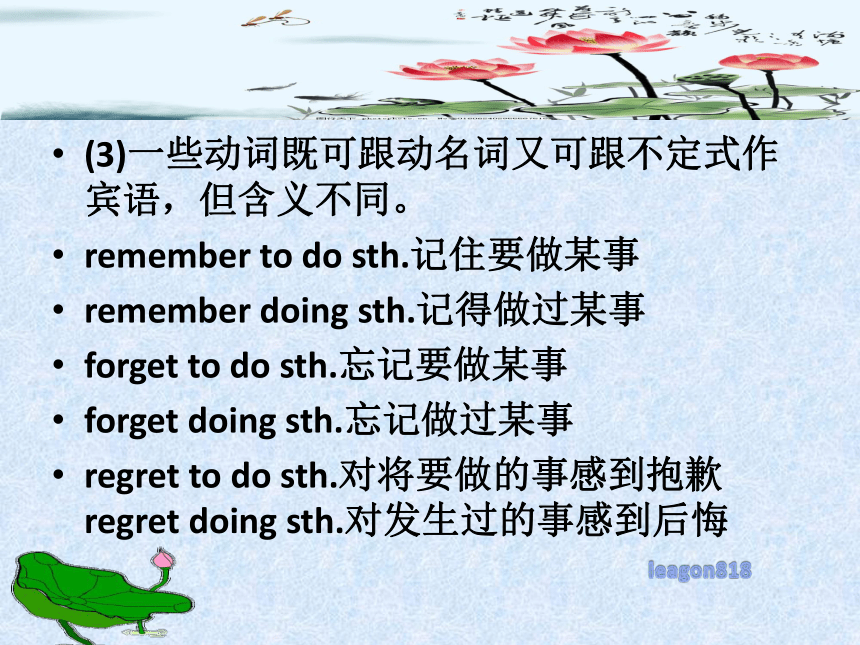
文档简介
(共31张PPT)
UNIT1 Living well
Grammar
动词不定式
一、动词不定式的构成
动词不定式由“to+动词原形”构成。
这里的to是不定式标志,没有词义。
不定式具有名词、形容词或副词的某些语法功能,又有动词的时态和语态的特点及作用。
They seem to have known each other for a long time.
他们好像认识好长时间了。
They pretended to be working hard when the teacher came in.
老师进来时他们假装正在用功。
二、时态与语态
时态 主动语态 被动语态 意义
一般时 to do to be done 表示动作与谓语动作同时发生或发生在谓语动作之后
完成时 to have done to have been done 表示动作发生在谓语动作之前
进行时 to be doing ? 表示谓语动作发生时,不定式的动作正在进行
I wanted the letter to be typed at once.
我要这封信立刻打印出来。
I think it's an honour to have been given a chance to speak at the meeting.
被给予机会在会上发言,我感到荣幸。
注意: 当不定式逻辑主语不是句子的主语时,就要在不定式前加上其逻辑主语,该逻辑主语通常由for或of引出。
It's easy for him to work out this maths problem.
对他来说解出这道数学题很容易。
It's careless of you to make such a mistake.
出了这样的错误,你太粗心了。
三、动词不定式的否定形式
动词不定式的否定式是在不定式符号to前加not, 不带to的不定式则在动词前加not。
Zhang Ming asked me not to stay at home all day.
张明叫我不要整天待在家里。
My mother let me not do it by myself.
妈妈让我不要独自做这件事。
四、动词不定式的句法功能
动词不定式在句中不能独立作谓语,但可以作主语、宾语、宾语补足语、定语、表语和状语等多种成分。
1.不定式作主语
不定式短语作主语时,句子的谓语动词用单数形式。若不定式结构比较复杂,往往用it作形式主语,真正的主语放在句子的后面。
To catch the 5:00 bus early in the morning is not a good idea.
赶早晨5点的公共汽车不是个好主意。
It is not a good idea to catch the 5:00 bus early in the morning.
一大早赶5点的公共汽车不是个好主意。
注意:
在“It is+adj.+不定式复合结构”句型中,当其中的形容词用来说明不定式逻辑主语的性格特点时,要由of引出逻辑主语,不能用for。这类形容词主要有bold、 brave、 careful、 careless、 clever、 considerate、 cruel、 foolish、 honest、 kind、 nice、 rude、 stupid、 silly、 thoughtful、 wise等。
It is very kind of you to help me.
你帮我真是太好了。
5
考题回顾
①(新课标全国卷Ⅰ) It took years of work____ (reduce) the industrial pollution and clean the water.
(答案to reduce)
②(山东高考) It's standard practice for a company like this one ____(employ) a security officer.
答案to employ
2.不定式作宾语
(1)后面常跟不定式作宾语的动词有decide/determine、 learn、 choose、 plan、 refuse、 promise、 want/attempt、 pretend、 offer、 manage、 expect/wish/hope、 agree、 ask/beg、 help、 prepare、 threaten、 tend、 claim、 desire/long、 apply、 fail、 hesitate。
The driver failed to see the other car in time.
司机没能及时看见另一辆车。
He can't afford to buy the expensive car.
他买不起那辆昂贵的小汽车。
(2)常用句型“主语+v.+it+adj./n.+to do sth.”。其中,it为形式宾语,to do ...为真正的宾语。能用于这一句型的动词有think、 find、 make、 believe、 consider、 suppose、 feel等。
I think it useful to learn a foreign language.
我认为学门外语很有用。
(3)一些动词既可跟动名词又可跟不定式作宾语,但含义不同。
remember to do sth.记住要做某事
remember doing sth.记得做过某事
forget to do sth.忘记要做某事
forget doing sth.忘记做过某事
regret to do sth.对将要做的事感到抱歉regret doing sth.对发生过的事感到后悔
try to do sth.设法做某事;试图做某事
try doing sth.试着做某事
mean to do sth.打算做某事;想要做某事
mean doing sth.意味着做某事;就是做某事
stop to do sth.停下来做另一件事
stop doing sth.停止做某件事
I remember seeing you somewhere before.
我记得以前在哪儿见过你。
Please remember to turn off the light when you leave.
离开时请记得关好灯。
考题回顾:
① (新课标全国卷Ⅱ) I heard a passenger behind me shouting to the driver, but he refused ____(stop) until we reached the next stop.
答案to stop
②(安徽高考) I remembered___ (lock) the door before I left the office, but forgot to turn off the lights.
答案to lock
3.不定式作表语
位于be、 become、 sound、 taste、 seem 等系动词后面,常表示将来的动作或起解释说明作用,其主语常常是wish、 idea、 task、 purpose、 duty、 job等表示意向、打算、计划的词。
His dream is to be a doctor.
他的梦想是成为一名医生。
My work is to clean the room every day.
我的工作是每天清扫房间。
考题回顾:
(重庆高考) The engine just won't start. Something seems _____(go) wrong with it.
答案to have gone
4.不定式作宾语补足语和主语补足语
(1)常跟不定式作宾语补足语的动词有ask、 tell、 invite、 get、 advise、 allow、 want、 permit、 warn、 hate、 encourage、 prefer、 expect、 order、 wish等;有些动词常跟“to be+adj.”构成复合结构,如think、 consider、 imagine、 prove、 find、 know、 suppose等。
Father will not allow us to play on the street.
父亲不让我们在街上玩耍。
We believe him to be honest.
我们相信他是诚实的。
考题回顾:
(江西高考改编)He is thought _____(act) foolishly. Now he has no one but himself to blame for losing the job.
答案to have acted
(2)在make、 let、 have、 see、 hear、 watch、 notice、 feel、 observe、 listen to、 look at等动词(词组)后的复合宾语中,不定式不带to,变为被动语态时则要带to,此时不定式作主语补足语。在help后,不定式可以带to,也可以不带to。
The boss made the workers work 10 hours a day.
老板让工人们一天工作10小时。(宾语补足语)
The workers were made to work 10 hours a day by the boss.
工人们被老板要求一天工作10小时。(主语补足语)
考题回顾:
(江西高考)Having finished her project, she was invited by the school ____(speak) to the new students.
答案to speak
5.不定式作状语
动词不定式作状语可表示目的、原因及结果等,其逻辑主语就是句子的主语,因此动词不定式作状语往往用主动式。
(1)表示目的,也可用于so as和in order之后表强调。
She went to the hospital to see her grandfather yesterday.
昨天她去医院看望了她爷爷。
She asked me to drive her to the airport in order to catch the 10:00 am plane.
为了赶上上午10点的飞机,她让我开车把她送到机场。
考题回顾:
①(北京高考) ___(make) it easier to get in touch with us, you'd better keep this card at hand.
答案To make
②(陕西高考改编)____(work) out the difficult maths problem, I have consulted Professor Russell several times.
答案To work
(2)表示结果:可用于enough to、 so ... as to、 such ... as to、 only to ...以及too ... to等结构中。
Have you got enough room to seat all of us?
你有足够的空间让我们都坐下吗?
She is too weak to join us in the outing.
她太虚弱,以致不能加入我们的旅行。
?
注意: only to do sth.与only doing sth.都可作结果状语,其区别是only to do sth.表示一个与主语愿望相反或出乎主语意料的结果,或用来暗示最初的未能实现的动作;only doing sth.表示谓语动词本身的动作造成的结果。另外,only doing也可作伴随状语,表示与谓语动词同时发生的动作。
He searched the box only to find nothing.
他搜查了这个箱子,没发现什么。
His father passed away, only leaving him a little money.
他父亲去世了,只给他留下了少量的钱。
考题回顾:
(天津高考)Anxiously, she took the dress out of the package and tried it on, only___ (find) it didn't fit.
答案to find
(3)表示原因:常用于表示情绪或心理活动的形容词之后。
They were surprised to be informed of the news.
得知这个消息,他们很惊讶。
I'm glad to hear this.
我很高兴听到这个(消息)。
(4)用于“be+性质形容词+不定式”结构中。常见的形容词有easy、 hard、 difficult、 interesting、 heavy、 pleasant、 light、 good、 fit、 comfortable、 safe、 dangerous、 impossible等。
The box is not easy to carry.
这个箱子不易携带。
考题回顾:
(辽宁高考)This machine is very easy ____(operate). Anybody can learn to use it in a few minutes.
答案to operate
6.不定式作定语
(1)动词不定式常常放在抽象名词attempt、 ability、 chance、 desire、 determination、 decision、 effort、 plan、 way或不定代词something、 nothing等后面作后置定语。
Do you have the ability to read and write in English?
你具备读写英语的能力吗?
I have no chance to go sightseeing.
我没有机会外出观光。
(2)用来修饰被序数词、最高级或no、 all、 any等限定的中心词,且与中心词为主动关系。
He was the best man to do the job.
他是做这项工作最好的人选。
五、“疑问词+动词不定式”结构
疑问词“what、 how、 when、 where、 which+动词不定式”结构可作主语、表语和宾语等。
How to solve the problem is still a challenge for us.
如何解决这个问题对我们仍是一个挑战。
I don't know where to buy books of this kind.
我不知道到哪里去买这种书。
六、动词不定式的省略
(1)“Why .../Why not ...?”表示建议,后接省略to的动词不定式。
Why not visit the World Expo?
为什么不去参观世博会呢?
(2)would rather、 had better、 may as well等后接省略to的不定式。
You'd better lose some weight.你最好减肥。
(3)can't help but、 cannot but、 do nothing but等后接省略to的不定式。
I can't but choose to go.我不得不去。
I could do nothing but wait until he came back.
我什么也不能做,只能等他回来。
七、专题训练
用所给词的适当形式填空
1.Tom worked hard, only___ (fail) again at last.
2.It is no good____ (watch) too much TV for children.
3.It's good ____(help) others when they are in trouble.
4.The man downstairs told the man upstairs not___ (drop) his shoes onto the floor at midnight any more.
5.The goal of this activity is ___(meet) the needs of common people.
6.Let me___ (hear) you___ (play) the violin.
7.The question is very difficult _____(answer).
8.He was forced___ (take) a position that was paid less money.
9.He pretended____ (read) the text when I came in.
答案1 to fail 2 watching3 to help 4 to drop 5 to meet 6 hear play7 to answer 8 to take 9 to be reading
Thanks for watching!
See you next time!
UNIT1 Living well
Grammar
动词不定式
一、动词不定式的构成
动词不定式由“to+动词原形”构成。
这里的to是不定式标志,没有词义。
不定式具有名词、形容词或副词的某些语法功能,又有动词的时态和语态的特点及作用。
They seem to have known each other for a long time.
他们好像认识好长时间了。
They pretended to be working hard when the teacher came in.
老师进来时他们假装正在用功。
二、时态与语态
时态 主动语态 被动语态 意义
一般时 to do to be done 表示动作与谓语动作同时发生或发生在谓语动作之后
完成时 to have done to have been done 表示动作发生在谓语动作之前
进行时 to be doing ? 表示谓语动作发生时,不定式的动作正在进行
I wanted the letter to be typed at once.
我要这封信立刻打印出来。
I think it's an honour to have been given a chance to speak at the meeting.
被给予机会在会上发言,我感到荣幸。
注意: 当不定式逻辑主语不是句子的主语时,就要在不定式前加上其逻辑主语,该逻辑主语通常由for或of引出。
It's easy for him to work out this maths problem.
对他来说解出这道数学题很容易。
It's careless of you to make such a mistake.
出了这样的错误,你太粗心了。
三、动词不定式的否定形式
动词不定式的否定式是在不定式符号to前加not, 不带to的不定式则在动词前加not。
Zhang Ming asked me not to stay at home all day.
张明叫我不要整天待在家里。
My mother let me not do it by myself.
妈妈让我不要独自做这件事。
四、动词不定式的句法功能
动词不定式在句中不能独立作谓语,但可以作主语、宾语、宾语补足语、定语、表语和状语等多种成分。
1.不定式作主语
不定式短语作主语时,句子的谓语动词用单数形式。若不定式结构比较复杂,往往用it作形式主语,真正的主语放在句子的后面。
To catch the 5:00 bus early in the morning is not a good idea.
赶早晨5点的公共汽车不是个好主意。
It is not a good idea to catch the 5:00 bus early in the morning.
一大早赶5点的公共汽车不是个好主意。
注意:
在“It is+adj.+不定式复合结构”句型中,当其中的形容词用来说明不定式逻辑主语的性格特点时,要由of引出逻辑主语,不能用for。这类形容词主要有bold、 brave、 careful、 careless、 clever、 considerate、 cruel、 foolish、 honest、 kind、 nice、 rude、 stupid、 silly、 thoughtful、 wise等。
It is very kind of you to help me.
你帮我真是太好了。
5
考题回顾
①(新课标全国卷Ⅰ) It took years of work____ (reduce) the industrial pollution and clean the water.
(答案to reduce)
②(山东高考) It's standard practice for a company like this one ____(employ) a security officer.
答案to employ
2.不定式作宾语
(1)后面常跟不定式作宾语的动词有decide/determine、 learn、 choose、 plan、 refuse、 promise、 want/attempt、 pretend、 offer、 manage、 expect/wish/hope、 agree、 ask/beg、 help、 prepare、 threaten、 tend、 claim、 desire/long、 apply、 fail、 hesitate。
The driver failed to see the other car in time.
司机没能及时看见另一辆车。
He can't afford to buy the expensive car.
他买不起那辆昂贵的小汽车。
(2)常用句型“主语+v.+it+adj./n.+to do sth.”。其中,it为形式宾语,to do ...为真正的宾语。能用于这一句型的动词有think、 find、 make、 believe、 consider、 suppose、 feel等。
I think it useful to learn a foreign language.
我认为学门外语很有用。
(3)一些动词既可跟动名词又可跟不定式作宾语,但含义不同。
remember to do sth.记住要做某事
remember doing sth.记得做过某事
forget to do sth.忘记要做某事
forget doing sth.忘记做过某事
regret to do sth.对将要做的事感到抱歉regret doing sth.对发生过的事感到后悔
try to do sth.设法做某事;试图做某事
try doing sth.试着做某事
mean to do sth.打算做某事;想要做某事
mean doing sth.意味着做某事;就是做某事
stop to do sth.停下来做另一件事
stop doing sth.停止做某件事
I remember seeing you somewhere before.
我记得以前在哪儿见过你。
Please remember to turn off the light when you leave.
离开时请记得关好灯。
考题回顾:
① (新课标全国卷Ⅱ) I heard a passenger behind me shouting to the driver, but he refused ____(stop) until we reached the next stop.
答案to stop
②(安徽高考) I remembered___ (lock) the door before I left the office, but forgot to turn off the lights.
答案to lock
3.不定式作表语
位于be、 become、 sound、 taste、 seem 等系动词后面,常表示将来的动作或起解释说明作用,其主语常常是wish、 idea、 task、 purpose、 duty、 job等表示意向、打算、计划的词。
His dream is to be a doctor.
他的梦想是成为一名医生。
My work is to clean the room every day.
我的工作是每天清扫房间。
考题回顾:
(重庆高考) The engine just won't start. Something seems _____(go) wrong with it.
答案to have gone
4.不定式作宾语补足语和主语补足语
(1)常跟不定式作宾语补足语的动词有ask、 tell、 invite、 get、 advise、 allow、 want、 permit、 warn、 hate、 encourage、 prefer、 expect、 order、 wish等;有些动词常跟“to be+adj.”构成复合结构,如think、 consider、 imagine、 prove、 find、 know、 suppose等。
Father will not allow us to play on the street.
父亲不让我们在街上玩耍。
We believe him to be honest.
我们相信他是诚实的。
考题回顾:
(江西高考改编)He is thought _____(act) foolishly. Now he has no one but himself to blame for losing the job.
答案to have acted
(2)在make、 let、 have、 see、 hear、 watch、 notice、 feel、 observe、 listen to、 look at等动词(词组)后的复合宾语中,不定式不带to,变为被动语态时则要带to,此时不定式作主语补足语。在help后,不定式可以带to,也可以不带to。
The boss made the workers work 10 hours a day.
老板让工人们一天工作10小时。(宾语补足语)
The workers were made to work 10 hours a day by the boss.
工人们被老板要求一天工作10小时。(主语补足语)
考题回顾:
(江西高考)Having finished her project, she was invited by the school ____(speak) to the new students.
答案to speak
5.不定式作状语
动词不定式作状语可表示目的、原因及结果等,其逻辑主语就是句子的主语,因此动词不定式作状语往往用主动式。
(1)表示目的,也可用于so as和in order之后表强调。
She went to the hospital to see her grandfather yesterday.
昨天她去医院看望了她爷爷。
She asked me to drive her to the airport in order to catch the 10:00 am plane.
为了赶上上午10点的飞机,她让我开车把她送到机场。
考题回顾:
①(北京高考) ___(make) it easier to get in touch with us, you'd better keep this card at hand.
答案To make
②(陕西高考改编)____(work) out the difficult maths problem, I have consulted Professor Russell several times.
答案To work
(2)表示结果:可用于enough to、 so ... as to、 such ... as to、 only to ...以及too ... to等结构中。
Have you got enough room to seat all of us?
你有足够的空间让我们都坐下吗?
She is too weak to join us in the outing.
她太虚弱,以致不能加入我们的旅行。
?
注意: only to do sth.与only doing sth.都可作结果状语,其区别是only to do sth.表示一个与主语愿望相反或出乎主语意料的结果,或用来暗示最初的未能实现的动作;only doing sth.表示谓语动词本身的动作造成的结果。另外,only doing也可作伴随状语,表示与谓语动词同时发生的动作。
He searched the box only to find nothing.
他搜查了这个箱子,没发现什么。
His father passed away, only leaving him a little money.
他父亲去世了,只给他留下了少量的钱。
考题回顾:
(天津高考)Anxiously, she took the dress out of the package and tried it on, only___ (find) it didn't fit.
答案to find
(3)表示原因:常用于表示情绪或心理活动的形容词之后。
They were surprised to be informed of the news.
得知这个消息,他们很惊讶。
I'm glad to hear this.
我很高兴听到这个(消息)。
(4)用于“be+性质形容词+不定式”结构中。常见的形容词有easy、 hard、 difficult、 interesting、 heavy、 pleasant、 light、 good、 fit、 comfortable、 safe、 dangerous、 impossible等。
The box is not easy to carry.
这个箱子不易携带。
考题回顾:
(辽宁高考)This machine is very easy ____(operate). Anybody can learn to use it in a few minutes.
答案to operate
6.不定式作定语
(1)动词不定式常常放在抽象名词attempt、 ability、 chance、 desire、 determination、 decision、 effort、 plan、 way或不定代词something、 nothing等后面作后置定语。
Do you have the ability to read and write in English?
你具备读写英语的能力吗?
I have no chance to go sightseeing.
我没有机会外出观光。
(2)用来修饰被序数词、最高级或no、 all、 any等限定的中心词,且与中心词为主动关系。
He was the best man to do the job.
他是做这项工作最好的人选。
五、“疑问词+动词不定式”结构
疑问词“what、 how、 when、 where、 which+动词不定式”结构可作主语、表语和宾语等。
How to solve the problem is still a challenge for us.
如何解决这个问题对我们仍是一个挑战。
I don't know where to buy books of this kind.
我不知道到哪里去买这种书。
六、动词不定式的省略
(1)“Why .../Why not ...?”表示建议,后接省略to的动词不定式。
Why not visit the World Expo?
为什么不去参观世博会呢?
(2)would rather、 had better、 may as well等后接省略to的不定式。
You'd better lose some weight.你最好减肥。
(3)can't help but、 cannot but、 do nothing but等后接省略to的不定式。
I can't but choose to go.我不得不去。
I could do nothing but wait until he came back.
我什么也不能做,只能等他回来。
七、专题训练
用所给词的适当形式填空
1.Tom worked hard, only___ (fail) again at last.
2.It is no good____ (watch) too much TV for children.
3.It's good ____(help) others when they are in trouble.
4.The man downstairs told the man upstairs not___ (drop) his shoes onto the floor at midnight any more.
5.The goal of this activity is ___(meet) the needs of common people.
6.Let me___ (hear) you___ (play) the violin.
7.The question is very difficult _____(answer).
8.He was forced___ (take) a position that was paid less money.
9.He pretended____ (read) the text when I came in.
答案1 to fail 2 watching3 to help 4 to drop 5 to meet 6 hear play7 to answer 8 to take 9 to be reading
Thanks for watching!
See you next time!
